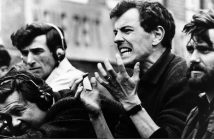Can swallowing too much toothpaste send you insane? Or the aluminium in your underarm deodorant? Your mobile phone signal can definitely fry your brain, and I’m pretty sure some people go crazy from the Wi-Fi in their homes. Then there are the mind-control beams, the ones the government fire at our twitching, fearful bodies at night. And the bugs! The modern world could send you spiralling into insanity if you think about it too much; an idea that lies at the heart of Bug.
Agnes (Ashley Judd) is bored, lonely, poor, and free after escaping an abusive marriage. She stands on the porch of her Oklahoma motel room, works nights at a lesbian bar, and doesn’t do a lot in between. Pete (Michael Shannon), a war veteran, appears after an innocuous introduction and seems interested in her. Agnes resignedly lets him into her life. He doesn’t leave – and they live together at the motel by default.
Pete gradually infects Agnes with the notion that bugs are everywhere in her home. It’s a disease that Pete has been carrying, ready to unleash on a vulnerable mind. By the time we realise he is paranoid and delusional, Agnes is already snared. Using either luck or design, he has entered her life at exactly the right time to get “under her skin”.
Pete sees the bugs everywhere: insects sent by the government to spy and control us; insidious bugs that we can’t see but know are there because he tells us. Through a creepily charismatic performance, he drags her into his madness. Orbiting around them are Agnes’s best friend, her ex-husband and someone who may or may not be “looking after” Pete. But this film is essentially a two-hander that can be distilled down to the log-line: “a couple go crazy in a motel room.” It escalates, it escalates and then, at the end, it escalates even more. A lot of tin-foil and fly paper is involved.
The limited sets and the small cast give it the air of a stage play, and this is no surprise given it was originally written for theatre by Tracy Letts. This economy of scale contributes to the claustrophobia: you can feel that Agnes’s life is rapidly imploding. In no time the couple have cut themselves off from the ‘normal’ world, retreating into the confines of the motel room.
What impresses is that this film has two central performances that will keep you mesmerised, and that it’s overseen by a veteran director who keeps it feverish and unexpected. It has all the bravado and edginess of a first-time director – a director who hasn’t been trampled by the studio system yet. It’s exciting to see Ashley Judd deliver as intense a performance as this, and Michael Shannon brings a probing, uncomfortable stare and a set of mannerisms that are eerily effective. The director is clever enough to keep this character simmering on just the right side of socially acceptable. When Pete has to show his true nature, Shannon steps up and gives a devilishly manic turn.
Friedkin has shocked and thrilled before with a diverse portfolio that includes The Exorcist, The French Connection, To Live and Die in L.A. and Cruising. Some critics might say he reached a creative peak in the 1970s and early 1980s, but in Bug he shows that this assessment is not accurate. This film delivers all of the passion and emotion we saw in earlier works.
There may be no strong authorial stamp on most of Friedkin’s films but they do share an energy, a bravery and a love of putting human beings through physical and metaphysical extremes. This seems to be the common thread that connects them. Bug is no different. Amongst the body horror and delusion there are points to be made about moral panics in the media, social alienation, diagnosis of mental illness and the culture of conspiracy theory. Bug is a film about paranoia and loneliness, and has the power to make you feel dirty and disorientated.
Steve Thompson is a writer and cartoonist. He once tried his hand at stand-up comedy, but he’s been sitting down ever since. Follow him on Twitter.





1 Comment
What a ridiculously good film! I watched it on Friday night on Steve’s recommendation, and loved it. I adore dramatisations of the idea of ‘folie à deux’ (madness shared by two).